|
|
|
Sort Order |
|
|
|
Items / Page
|
|
|
|
|
|
|
| Srl | Item |
| 1 |
ID:
141515
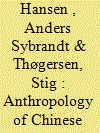

|
|
|
|
|
| Summary/Abstract |
The contemporary world is experiencing massive transnational population movements under the banner of higher education. This is in no small part due to the People’s Republic of China (PRC). Beginning in the late 1970s, PRC policies have actively encouraged young Chinese to go abroad to study as part of their higher education. Since then, the state has increasingly relinquished control over educational migration, turning instead to creating incentives for academic “talents” in key fields to either return to China or serve Chinese interests while living abroad (Liu 2014; Xiang and Shen 2009; Zweig, Fung, and Han 2008). Concurrent with this political relaxation, average Chinese incomes have risen dramatically, and higher education has grown gradually more integrated at a global level. The result has been remarkable. For some years now, China has been the largest global source of transnational students.
|
|
|
|
|
|
|
|
|
|
|
|
|
|
|
|
| 2 |
ID:
164299
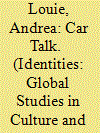

|
|
|
|
|
| Summary/Abstract |
The apparent conspicuous consumption of luxury vehicles by Chinese international students attending a public Michigan University provides an opportunity to examine the convergence of different ideas about automobility. Upwardly mobile Chinese families send their children to Michigan, a state with a tradition of auto-production, for educational opportunities not available in China. The resulting ‘car talk’ of local residents about Chinese students and their cars speaks to broader anxieties about Michigan’s shifting relationship to the global economy. However, the paper focuses on the meanings of auto-owning created by Chinese students who make decisions about the purchase and use of their autos within a social world oriented primarily to other Chinese students and societal ideas about auto-owning circulating among friends, family and society in China. For Chinese students, car owning encompasses meanings of status, safety and sociability that are created within the context of study abroad.
|
|
|
|
|
|
|
|
|
|
|
|
|
|
|
|
| 3 |
ID:
186063
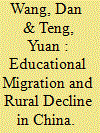

|
|
|
|
|
| Summary/Abstract |
China has witnessed considerable rural educational migration in the last decade. Many rural families have been sending their children to nearby urban schools, accompanied by an adult family member who relocates to live with the child in the urban setting. Drawing on 128 in-depth interviews and 814 questionnaires with rural parents/guardians of primary-school students, plus more than 100 teachers, villagers, and officials in one county, this study investigates this widespread type of educational migration and the adverse consequences on the social and economic development of villages.
|
|
|
|
|
|
|
|
|
|
|
|
|
|
|
|
| 4 |
ID:
139289
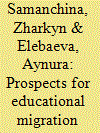

|
|
|
|
|
| Summary/Abstract |
As globalization of the world economy increases, the scope of intellectual migration continues to spread. One of its forms is student or educational migration—a phenomenon that largely dates to the end of the 20th century and has not been sufficiently studied so far. As for Kyrgyzstan, this is essentially the first time intellectual and student migration has been studied.
Any migration, including intellectual, undermines a country’s national potential. It should also be kept in mind that the host countries use migrants to achieve specific ideological and political goals.
|
|
|
|
|
|
|
|
|
|
|
|
|
|
|
|
| 5 |
ID:
141520
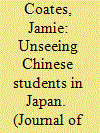

|
|
|
|
|
| Summary/Abstract |
Chinese migrants are currently the largest group of non-Japanese nationals living in Japan. This growth is largely the result of educational migration, positioning many Chinese in Japan as student-migrants. Based on 20 months’ ethnographic fieldwork in Ikebukuro, Tokyo’s unofficial Chinatown, this paper explores the ways in which the phenomenology of the city informs the desire for integration amongst young Chinese living in Japan. Discussions of migrant integration and representation often argue for greater recognition of marginalised groups. However, recognition can also intensify vulnerability for the marginalised. Chinese student-migrants’ relationship to Ikebukuro’s streets shows how young mobile Chinese in Tokyo come to learn to want to be “unseen.” Largely a response to the visual dynamics of the city, constituted by economic inequality, spectacle, and surveillance, the experiences of young Chinese students complicate the ways we understand migrants’ desires for recognition and integration.
|
|
|
|
|
|
|
|
|
|
|
|
|
|
|
|
|
|
|
|
|